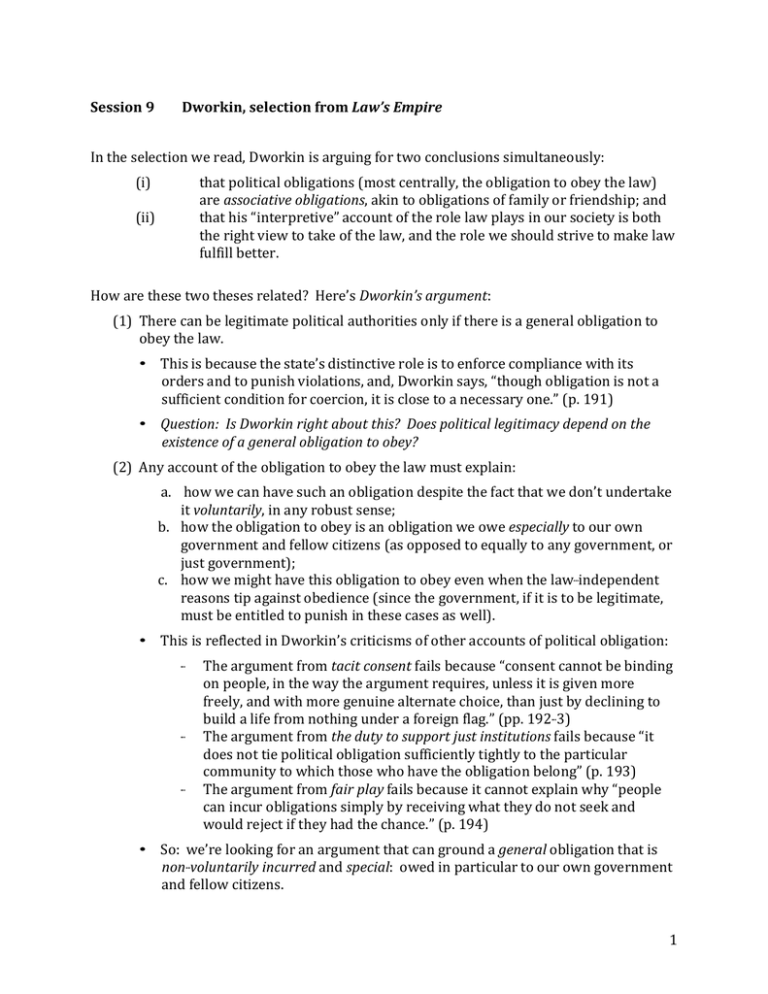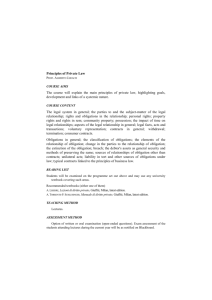In the selection we read, Dworkin is arguing for two... (i) that political obligations (most centrally, the obligation to obey the... Session 9
advertisement

Session 9 Dworkin, selection from Law’s Empire In the selection we read, Dworkin is arguing for two conclusions simultaneously: (i) that political obligations (most centrally, the obligation to obey the law) are associative obligations, akin to obligations of family or friendship; and that his “interpretive” account of the role law plays in our society is both the right view to take of the law, and the role we should strive to make law fulfill better. (ii) How are these two theses related? Here’s Dworkin’s argument: (1) There can be legitimate political authorities only if there is a general obligation to obey the law. • This is because the state’s distinctive role is to enforce compliance with its orders and to punish violations, and, Dworkin says, “though obligation is not a sufficient condition for coercion, it is close to a necessary one.” (p. 191) • Question: Is Dworkin right about this? Does political legitimacy depend on the existence of a general obligation to obey? (2) Any account of the obligation to obey the law must explain: a. how we can have such an obligation despite the fact that we don’t undertake it voluntarily, in any robust sense; b. how the obligation to obey is an obligation we owe especially to our own government and fellow citizens (as opposed to equally to any government, or just government); c. how we might have this obligation to obey even when the law-­­independent reasons tip against obedience (since the government, if it is to be legitimate, must be entitled to punish in these cases as well). • This is reflected in Dworkin’s criticisms of other accounts of political obligation: -­­ -­­ -­­ The argument from tacit consent fails because “consent cannot be binding on people, in the way the argument requires, unless it is given more freely, and with more genuine alternate choice, than just by declining to build a life from nothing under a foreign flag.” (pp. 192-­­3) The argument from the duty to support just institutions fails because “it does not tie political obligation sufficiently tightly to the particular community to which those who have the obligation belong” (p. 193) The argument from fair play fails because it cannot explain why “people can incur obligations simply by receiving what they do not seek and would reject if they had the chance.” (p. 194) • So: we’re looking for an argument that can ground a general obligation that is non--voluntarily incurred and special: owed in particular to our own government and fellow citizens. 1 • Questions: Is Dworkin right that the obligation to obey has these features? (For example, is obedience owed particularly to our own gov’t and fellow citizens?) The persuasiveness of Dworkin’s claims here partly rests on his grouping the duty to obey together with other duties that might be described as political obligations, such as the obligation to vote, or engage in the political process, or (for officials) carry out the laws in the right way… (3) Only associative obligations exhibit these characteristics: they’re non-­­voluntarily incurred, they’re owed particularly to other members of the association, and they give us reasons to do things even when the balance of association-­­independent reasons tips the other way. (Examples: family, friendship) • Question: are family associations and friendships different from political associations in ways that might make the former give rise to associative obligations while the latter do not? Some possible relevant differences: -­­ -­­ -­­ -­­ Size: can we really have the necessary concern for groups that exceed a certain size? Emotion: emotions play a much more significant role in family and friend--relations. Family relations and friendships are plausibly non--instrumentally valuable, whereas political associations might more plausibly be instrumentally valuable. Loyalty is constitutive of friendship (and perhaps family relations of the relevant sort – that give rise to obligations), but not of political associations, which can survive undiscovered acts of disobedience in a way that friendships can’t really survive undiscovered disloyalty. (4) So it’s plausible to think that the obligation to obey the law, if it exists, is an associative obligation. • Question: even if we think political obligation is a species of genuine associative obligation, why think the form such obligation takes is a duty of obedience? Why not think the appropriate response by a member of the association to a law that tells us to do something we have most independent reason not to do is, e.g., civil disobedience? (5) Associations must meet certain conditions for associative obligations to arise: a. They must be “bare” communities: they must meet the genetic or geographical or other historical conditions identified by social practice as capable of constituting a fraternal community. b. They must be “true” communities, which require meeting 4 conditions: (i) (ii) the obligations of the community must be regarded as special: owed to fellow members of the group; the obligations must be felt as personal: owed directly to other members of the group, not to the group as a whole; (Question: why? Are all communities like this? What about athletic teams? Why does Dworkin insist on this?) 2 (iii) the obligations must be regarded as flowing from an obligation of general concern, which generates specific obligations that go beyond any black-­­letter agreements worked out in advance; the group’s commitments must reflect equal concern for all members of the group (which needn’t entail equal treatment) (Question: what does equal concern come to? Can associative obligations result from unequal associations?) (iv) c. The associations cannot be “thoroughly and pervasively unjust” – in the sense that their commitments cannot be coherently described in any way that at the same time helps justify them. Such associations cannot generate any genuine associative obligations. (6) “Communities of principle” – that is, communities in which the law functions the way Dworkin argues it functions (and should function) in our own community – are the only ones that meet the requirements set out in (5) for generating genuine associative obligations. • De facto “communities of circumstance” fail to meet requirement b(i): the obligations their members recognize (if they recognize any obligations) are not felt to be owed specially to fellow members of the community. • Rule-­­book communities (remember Hart?!) fail to meet requirement b(iii): the obligations their members recognize are felt to be owed specially to fellow members of the community, but aren’t seen as flowing from a requirement of general concern: they are exhausted by the content of explicitly accepted rules. -­­ -­­ • Rule-­­book communities are about compromising between antagonistic interests and points of view. There seem to me to be some aspects of rule--book communities that do a very good job of representing the ideal functioning of our political community – which represents, after all, a compromise between many diverse interests, moral commitments, and points of view… Communities of principle meet all four conditions: their members see their obligations as owed especially to other members, as not exhausted by black-­­ letter law but rather flowing from a set of shared principles which the laws and their enforcement presupposes, and which generate obligations not made explicit by law; and the requirement that members be able to offer a coherent account of the community’s commitments that encompasses the commitments of all its members ensures equal concern. (7) So only communities of principle can support legitimate political authorities. (8) The US government, for all its faults, is a legitimate political authority (at least, we’ll want to interpret it’s commitments in a way that makes it legitimate. (9) So Dworkin (so he claims) must be right in interpreting the role of law in our society along the “interpretive”, integrity-­­emphasizing lines that he does. At the 3 very least, this is the only interpretation that allows our state to be legitimate, and we should strive to make it the true interpretation! • Of course, this conclusion depends on the sharp claim Dworkin makes at the outset: there can be no legitimate political authority in the absence of a general obligation to obey the law. • Also, as Dworkin acknowledges, the obligation to obey is (at most) a necessary condition for the legitimate use of force to ensure obedience. Why is the government justified in using force to compel fulfilling this one aspect of our political obligations, but not our other obligations (including other political obligations)? 4 MIT OpenCourseWare http://ocw.mit.edu 24.235J / 17.021J Philosophy of Law Spring 2012 For information about citing these materials or our Terms of Use, visit: http://ocw.mit.edu/terms.

